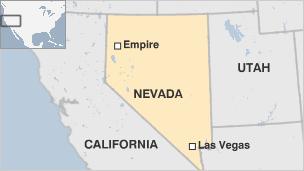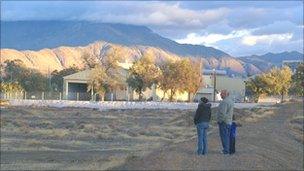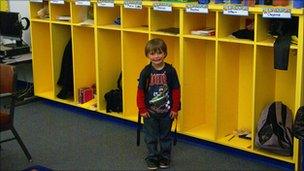End of Empire: Tough economy closes mining town
- Published
Empire, Nevada's population reduced drastically after the local mine shut down
Some outside observers have been quick to draw apocalyptic lessons from America's recent economic woes. But here in the Black Rock Desert, in remote north-western Nevada, it truly is the end of Empire.
The former company town, built around a gypsum mine and drywall plant, is fenced off and silent. Inhabitants gone, houses empty, plant idle.
A year ago, more than 300 people lived here in a bustling community that boasted two churches, a golf course and swimming pool.
But demand for gypsum-based wallboard had already collapsed with the downturn in the construction industry and the plant, which had been in continuous operation since the 1920s, was no longer viable.
No zipcode
When the United States Gypsum Corporation announced that operations would cease at the end of December 2010, the town's residents were told they had until the end of the school year to move out.

Bit by bit, over the months that followed, Empire died.
Viewed from a nearby hill, Empire still looks like an oasis of green amid the muted colours of sagebrush and the distant "playa", where land-speed records have been set and the annual Burning Man festival attracts tens of thousands of visitors every Labour Day.
But almost nothing is moving behind more than three miles (4.8km) of chain-link fencing that now surrounds the town, the plant and its small desert airstrip.
A handful of USG employees mow the lawns, maintain the houses and keep an eye on the mothballed plant.

Phillip Bollinger lost his job at the gypsum mine, while many close friends have moved away
In a statement to the BBC, USG said it is "our desire that US construction markets recover sufficiently to make it economically feasible to re-open the Empire plant and re-establish the surrounding community".
But the town's zip code, 89405, no longer exists, and former workers express doubt that it will ever open again.
From a scrubby ridge overlooking the town, Philip and Susan Bollinger can still see their house. The last one in a row, on the edge of town, where the trees finally give way to a vast expanse of desert.
"We felt the company would never go away," says Mr Bollinger, who worked for USG for more than four years.
He admits that out here it was easy to lose sight of events in the outside world.
"It was devastating," he says of the day the company broke the news.
"There was utter silence."
If the town and the plant are dead for now, the general store where Sunny De Forest works is clinging on. It sits on the main road, outside the fence. Without the regulars from Empire, it has to make do with occasional passers by.
"I never thought they would shut us down," says Ms De Forest, who worked for USG for 42 years.
"I'd like it to be a living, breathing town again," she says. "Maybe they have a plan."
Student exodus
Across the valley, six miles away, the closure of Empire has had other effects.

In the nearby town of Gerlach only nine students remain enrolled at the school
In the diminutive town of Gerlach, dwarfed by nearby Granite Peak, a thriving school has been utterly transformed.
Last year, there were 80 students and 25 staff. Now, with the departure of families from Empire, there are nine children and three teachers.
The high-school building is locked shut, its gleaming gymnasium and weights room no longer accessible.
Washoe County School Board contemplated closing the school altogether and bussing students to other schools.
But the nearest is 60 miles away.
The staff, who now perform two or three school functions each, say this reprieve has presented them with an opportunity.
"There will be a coming together," says head teacher Stacey Black, who moved to Gerlach from Los Angeles.
"We've had to rebuild our community. It's a challenge for all of us."
"Who would want to move to Gerlach without a school?" says Judy Conley, a teaching assistant who also operates as school secretary and groundswoman.
"I fix transcripts and then I pull weeds," she says, standing next to a well-maintained football field that costs $12,000 (£7,600) a year to maintain and may have to close.
Judy also runs Gerlach's library, which has been moved into her office.
Her husband, Steve, worked at Empire for 40 years, before he retired and the couple moved to Gerlach.
"That's where I raised my kids," Mrs Conley says. "It broke my heart to watch my friends leaving."
As for the students in Gerlach, who must all now study together and make the most of their unusual circumstances, there's plenty to miss with the passing of Empire.
"Now I don't really have any friends," laments 13-year old Gilbert Ratliff, who suddenly finds himself the oldest student in town, expected to set an example to the younger ones.
"It's kind of difficult," he says with a world-weary sigh. "I used to play around in class. Now I can't."
The families from Empire have scattered far and wide. The Bollingers went as far afield as Indiana before the simple desert life, and a job in a nearby gold mine, drew them back to Gerlach.
Their two eldest children make up almost a quarter of Gerlach's student population.
As they pause to look back on their life at Empire, they express no hard feelings. USG did what it had to do, Mr Bollinger believes.
But he's pessimistic about Empire's future.
"It's America's newest ghost town," he says.